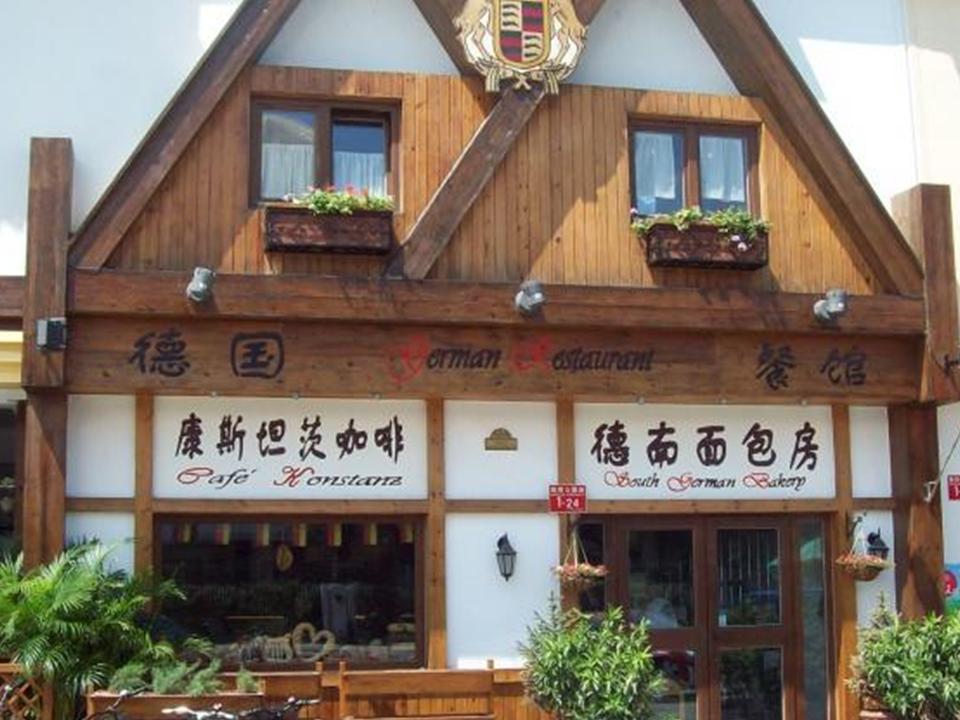#18 Globalization
 I strongly believe in the good of international trade. And yet there’s something which I have to get off my chest that could as well come from any of the anti-globalization fanatics out there: I ventured out of my hotel in Beijing today in order to find some good local Chinese food. Passing a BMW dealership first and then a Maybach showroom next (I had never seen one before), should have provided me with a clue. I wandered around for about one hour and the only restaurants I could find were foreign – the South German Cafe Konstanz, the OneThousandAndOneNights Middle Eastern restaurant, lots of Thai, Japanese and Korean eateries and, of course, a Starbucks. Disappointed I returned to my hotel, planning not to eat at all tonight. Instead I counted on having Chinese breakfast tomorrow morning. When I asked the concierge at the hotel where I could get good Chinese Youtiao, he suggested that I try KFC. Don’t get me wrong, I still believe that global trade is good, but could it be that we’re overdoing it?
I strongly believe in the good of international trade. And yet there’s something which I have to get off my chest that could as well come from any of the anti-globalization fanatics out there: I ventured out of my hotel in Beijing today in order to find some good local Chinese food. Passing a BMW dealership first and then a Maybach showroom next (I had never seen one before), should have provided me with a clue. I wandered around for about one hour and the only restaurants I could find were foreign – the South German Cafe Konstanz, the OneThousandAndOneNights Middle Eastern restaurant, lots of Thai, Japanese and Korean eateries and, of course, a Starbucks. Disappointed I returned to my hotel, planning not to eat at all tonight. Instead I counted on having Chinese breakfast tomorrow morning. When I asked the concierge at the hotel where I could get good Chinese Youtiao, he suggested that I try KFC. Don’t get me wrong, I still believe that global trade is good, but could it be that we’re overdoing it?

January 12, 2009 @ 10:16 pm
This article is very interesting and reflects some experience I’ve made as well during my business-journeys around the world. China is unique and is completely different as the European or North American culture. Nevertheless leaves this article the impression that one can’t even feel like in China when being in China.
From my point of view there is a risk of overdoing it with globalization. I think it is very important that local strengths, culture and lifestyle don’t disappear by globalization. The disadvantage is that countries and cultures leave attractiveness and uniqueness.
Of course are plenty of advantages caused by globalization such as i.e. reduction of destitution, putting products globally on disposal, development of economy, etc.
From my point of view a certain level of globalization is vital for the economy and for each individual. There must however be some limits because how would the world be when it is everywhere like at home with same language, same food, same lifestyle, etc.?
February 5, 2009 @ 2:16 pm
In my opinion, we definitely overdo it with globalization. It is one thing to trade goods on a worldwide-basis, but it is dangerous to adapt all sorts of “modern changes” just for the sake of it. I was born in Austria and nowadays I live in Vienna, but at times it is extremely difficult to find our own culture and traditions in our own country.
Please don’t get me wrong. I am not a racist at all, instead I do love to travel and during the last twenty years I lived and worked in different countries all over the world. This was only possible because of globalization.
Nevertheless, living in Southafrica did NOT mean to eat Wiener Schnitzel and Apfelstrudel. Instead I was invited to the typical southafrican Sunday Braai (barbecue party) and I enjoyed the ethical food, music and lifestyle. We should give unique traditions the chance to survive this globalization hype! I really do not want to be all the same all around the world.
April 16, 2009 @ 10:42 am
It is a very interesting article and the facts are definitely alarming, but on the other hand we have to understand the circumstances the Chinese were living in the past century. Compared to the western world they didn’t have a lot of opportunities to “buy” non Chinese (European, American,…) products.
So for them, it might be exciting to have a coffee at Star Bucks and to feel the American way of life – a lifestyle so different to what they had (and still have) before.
I personally think, it comes down to one essential question: Who much globalization can a country (their people) endure before they find out they transformed to somebody else?
December 3, 2016 @ 10:42 pm
Just a few weeks ago, a member of the Austrian parliament made her point of view regarding globalisation very clear: ‘Let him who is without sin cast the first iPhone’
It is true and I can only agree with that, especially those who lament the most about globalisation do simultaneously profit with it. How?
Well, there’s a reason why one receives his or her delivery already the next day when ordered on Amazon. Or why the Starbucks pumpkin spiced latte tastes the same, no matter if visiting LA or Vienna. Or why I can purchase the same nivea shower gel in Cape Town as in Graz. Or why we students may spend an Erasmus semester abroad. Or why, finally, one’s neighbors name is not a simple Moser, Huber or Müller anymore but the names have some foreign touch, bluntly said. And is good the way it is.
Globalisation forces one to broaden his or her mind and learn a lot about distant countries and unknown cultures. Never had the world been smaller and yet it is so big and diverse. Travelling is not a privilege lived only by the rich anymore but everyone can and should experience this kind of adventure in order to get to know the unknown and also introduce our culture to the others. Ever felt pride when telling your new friends from abroad about the scary krampus tradition around Christmas? Ever felt like defending your home country when enlightening someone about the differences between Australia and Austria? This is what globalisation brings with it too: be open towards the new, be open-minded and try the new dish. At the same time, always remember your roots and remember that your home country bears a lot of great things too. Especially remember it when another new burger restaurant opens in Graz and you immediately want to try it out – but it gets harder and harder to find good traditional local kitchen. Is it that what we want, after all?
December 11, 2021 @ 6:23 am
After reading this article and taking into consideration my personal travels to various countries, I can understand why one would say we overdo globalization and take it to extremes at times. I have always believed that there must be a balance when it comes to anything; when it comes to globalization, I believe there should be certain limits and extents to globalization, ideally where a country can broaden the goods and services it provides in order to benefit both the individual and economy while also retaining its unique culture and without disregarding the rights and concerns of the people and environment. As I mentioned, I have been fortunate enough to travel to many countries. As such, I have been able to see the benefits of globalization, such as how both developed and developing countries have a more broadened access to goods and services, how people have been lifted out of poverty, how both information and technology can now flow, spread, and advance throughout the world, and an overall increase in both cultural awareness and global cooperation,. However, I have also seen the drawbacks of globalization, such as the loss of jobs as companies can now afford low-cost labor, the lack of rights and concerns whether they be human, environmental, or labor, and cultural homogeneity where a country’s unique culture, customs/practices, and language(s) can become lost due to excessive cultural influences from other countries which could lead to a monoculture. However, regardless of one’s perspectives on the matter, I believe it will be safe to say that both supporters and non-supporters of globalization can agree it has created both winners and losers; one can reap the benefits as they can outweigh the drawbacks, or globalization can be rolled back and be improved upon when it comes to various issues like global trade policies.
https://smartasset.com/mortgage/the-pros-and-cons-of-globalization
https://www.geeksforgeeks.org/pros-and-cons-of-globalization/